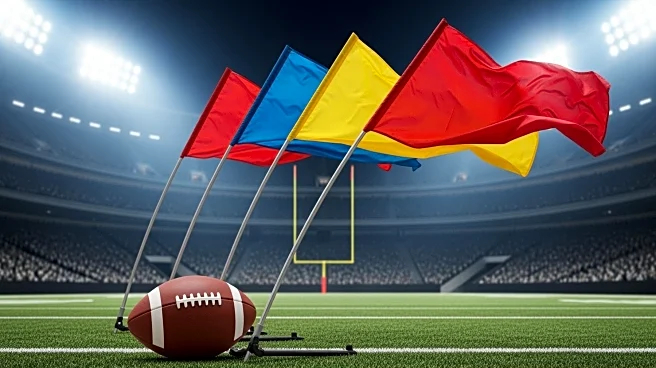What's Happening?
The NFL has announced that the 2026 Pro Bowl Games will be held during Super Bowl LX week in the Bay Area. The event will feature a flag football game between the NFC and AFC, scheduled for the Tuesday of Super Bowl week. This change is part of the league's
effort to spotlight flag football, which is set to debut at the 2028 Summer Olympics in Los Angeles. The Pro Bowl Games will be presented by Verizon and will take place at the Moscone Center in San Francisco. The format will be a 7-on-7 game on a 50-yard field with 10-yard end zones, maintaining traditional scoring methods. Voting for the Pro Bowl will begin on Thanksgiving Day, November 27.
Why It's Important?
The decision to move the Pro Bowl to Super Bowl week signifies the NFL's commitment to promoting flag football, a sport gaining international recognition. By aligning the Pro Bowl with the Super Bowl, the league aims to leverage its largest platform to showcase elite athleticism and dynamic action. This move could enhance the visibility of flag football, potentially increasing its popularity and paving the way for its Olympic debut. The change also reflects the NFL's strategic partnerships with the Bay Area Host Committee and ESPN, highlighting the league's efforts to innovate and expand its reach.
What's Next?
The Pro Bowl AFC vs NFC flag football game will be held at 8 p.m. ET on February 3 and will air on ESPN. As the event approaches, stakeholders such as players, coaches, and fans will likely engage in discussions about the new format and its implications for the sport. The NFL may also continue to develop promotional strategies to maximize the event's impact during Super Bowl week. Additionally, the league's focus on flag football could lead to further initiatives aimed at integrating the sport into mainstream athletic competitions.
Beyond the Headlines
The integration of flag football into the Pro Bowl and its upcoming Olympic debut may have broader implications for the sport's development. It could lead to increased investment in flag football programs at various levels, from youth leagues to professional circuits. The emphasis on flag football also aligns with growing concerns about player safety, offering a less contact-intensive alternative to traditional football. This shift may influence how the sport is perceived and played, potentially altering its cultural and athletic landscape.

















